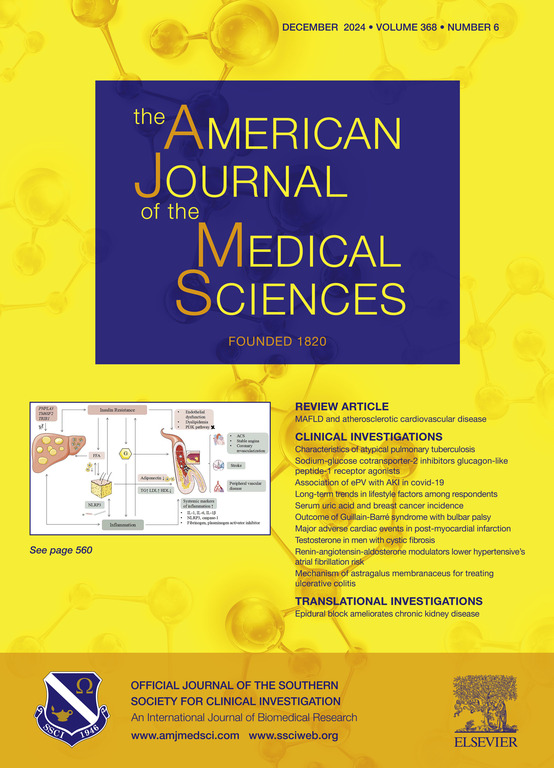Associations between serum uric acid and breast cancer incidence: A systematic review and meta-analysis
IF 2.3
4区 医学
Q2 MEDICINE, GENERAL & INTERNAL
引用次数: 0
Abstract
Background
Serum uric acid (SUA) may be involved in the development of cancer by inhibiting oxidative stress, but its relationship with breast cancer remains unclear.
Materials and Methods
The PubMed, Embase, and Web of Science databases were searched systematically for studies on SUA levels in women with breast cancer and the effect of SUA levels on the risk of breast cancer. The Newcastle‒Ottawa Quality Assessment Scale (NOS) was used to assess the quality of all relevant studies included.
Results
A total of 19 studies were included, including 75,827 women with breast cancer and 508,528 healthy controls. A meta-analysis found that SUA levels were negatively correlated with breast cancer risk in women (HR = 0.94, 95% CI: 0.89 - 0.99, p = 0.003). SUA levels in female breast cancer patients were not significantly different from those in healthy controls (SMD = 0.49, 95% CI = -0.09 - 1.08, p = 0.10), while SUA levels were increased in female breast cancer patients in articles published after 2010, SUA concentration detected by spectrophotometry, and non-Asian populations, regardless of menopausal state and treatment state.
Conclusion
High levels of SUA may reduce the risk of breast cancer in women, suggesting that SUA was a protective factor in women.
血清尿酸与乳腺癌发病率之间的关系:系统回顾和荟萃分析。
背景:血清尿酸(SUA)可能通过抑制氧化应激参与癌症的发生,但其与乳腺癌的关系仍不清楚:方法:我们在 PubMed、Embase 和 Web of Science 数据库中系统检索了有关乳腺癌女性 SUA 水平以及 SUA 水平对乳腺癌风险影响的研究。采用纽卡斯尔-渥太华质量评估量表(NOS)对所有纳入的相关研究进行质量评估:结果:共纳入了 19 项研究,包括 75,827 名乳腺癌女性患者和 508,528 名健康对照者。荟萃分析发现,SUA水平与女性乳腺癌风险呈负相关(HR = 0.94,95% CI:0.89 - 0.99,p = 0.003)。女性乳腺癌患者的SUA水平与健康对照组无明显差异(SMD = 0.49,95% CI = -0.09 - 1.08,p = 0.10),而在2010年后发表的文章、分光光度法检测到的SUA浓度以及非亚洲人群中,无论绝经状态和治疗状态如何,女性乳腺癌患者的SUA水平均有所增加:结论:高水平的SUA可降低女性罹患乳腺癌的风险,表明SUA是女性的一种保护因素。
本文章由计算机程序翻译,如有差异,请以英文原文为准。
求助全文
约1分钟内获得全文
求助全文
来源期刊
CiteScore
4.40
自引率
0.00%
发文量
303
审稿时长
1.5 months
期刊介绍:
The American Journal of The Medical Sciences (AJMS), founded in 1820, is the 2nd oldest medical journal in the United States. The AJMS is the official journal of the Southern Society for Clinical Investigation (SSCI). The SSCI is dedicated to the advancement of medical research and the exchange of knowledge, information and ideas. Its members are committed to mentoring future generations of medical investigators and promoting careers in academic medicine. The AJMS publishes, on a monthly basis, peer-reviewed articles in the field of internal medicine and its subspecialties, which include:
Original clinical and basic science investigations
Review articles
Online Images in the Medical Sciences
Special Features Include:
Patient-Centered Focused Reviews
History of Medicine
The Science of Medical Education.

 求助内容:
求助内容: 应助结果提醒方式:
应助结果提醒方式:


